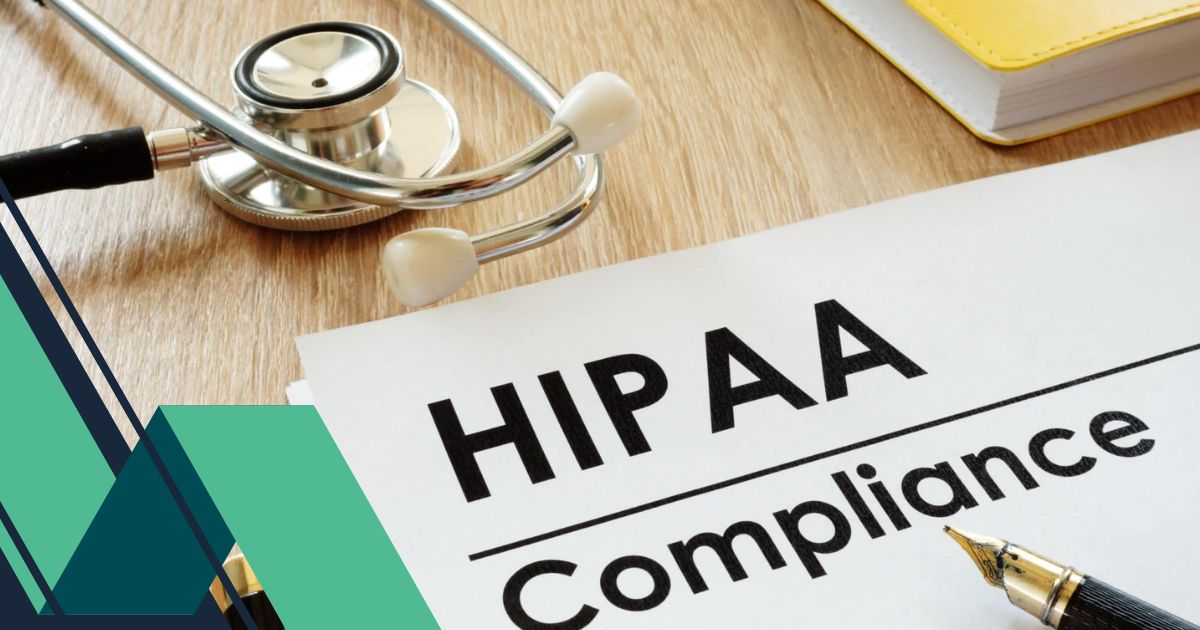In today’s digital age, healthcare marketing is more important than ever. Healthcare providers must reach out to their clients and explain the benefits of their services. Yet, healthcare marketing is different from other types of marketing. Due to the private nature of medical records, this problem calls for a unique solution, PHI (protected health information).
Compliance within the Health Insurance Portability and Accountability Act (HIPAA) is essential for healthcare digital marketing efforts. Privacy and security of PHI are guaranteed under HIPAA regulations. As a result, it is vital that any marketing effort adhere to HIPAA regulations and only reveal protected health information (PHI) after first obtaining the patient’s permission.
Healthcare providers are responsible for keeping their websites safe from hackers regarding patient information. Moreover, they need to ensure that the material on their website is clear and helpful to patients. HIPAA-compliant web design is a critical element of healthcare marketing.
HIPAA-compliant website design and marketing in the healthcare industry go hand in hand.
Healthcare providers are responsible for running HIPAA-compliant advertising campaigns on a safe and user-friendly website. It allows them to inform patients about their services without jeopardizing their confidentiality.
HIPAA Regulations: What Are They?

The HIPAA rules were enacted to safeguard individuals’ health records in 1996. Patients’ health records, treatment plans, and financial information are protected health information (PHI) and must adhere to HIPAA’s stringent privacy and security regulations.
Healthcare providers, health insurance companies, and healthcare clearinghouses are all examples of “covered entities” subject to HIPAA’s restrictions. These businesses must follow HIPAA rules when safeguarding their patients’ personal information.
Patients must receive notification of privacy practices, and the covered entity must obtain written authorization from the patient before disclosing any protected health information (PHI), with limited exceptions.
HIPAA mandates that covered entities take precautions to safeguard their patients’ personal information or face fines and other legal repercussions. Protecting patients’ personal health information (PHI) and ensuring that covered businesses follow national standards for security and confidentiality in healthcare are central goals of the HIPAA laws.
HIPAA Compliance Checklist
Compliance with HIPAA protects patients’ private health information and avoids legal trouble. A thorough HIPAA compliance checklist can be a great asset to any covered entity regarding patient privacy, security, and confidentiality.
The following are some of the essential things that covered businesses may do to ensure HIPAA compliance, protect ePHI, and educate staff:
- Evaluate an organization’s ability to protect its customers’ personal health information (PHI) through a risk assessment;
- Create a notice of privacy practices and a plan for reporting breaches in compliance with HIPAA;
- Secure electronically protected health information (ePHI) through administrative, technical, and physical measures, such as password protection, encryption, and locked storage;
- Instruction in HIPAA rules, policies, procedures, and best practices for protecting personal information is imperative;
- Perform HIPAA compliance audits regularly to guarantee continued conformity with rules.
Covered entities can safeguard patients’ protected health information and prevent legal repercussions for non-compliance by following a thorough HIPAA compliance checklist. Review policies and procedures frequently and update them to account for new requirements and security risks to protected health information.
HIPAA Risk Assessment
One of the essential things covered companies can do to protect the privacy, security, and confidentiality of patient health information is to conduct a HIPAA risk assessment.
An overview of the steps is as follows:
- Identify PHI: Determine what PHI is collected, processed, stored, and transmitted by the covered entity;
- Conduct a risk analysis: Identify risks associated with PHI, evaluate their likelihood of occurrence, and calculate the possible impact on the business;
- Develop a risk management plan: Create and implement safeguards to reduce or eliminate your discovered threats. Access restrictions, encryption, and proper device storage and disposal are all examples of administrative, physical, and technical precautions that businesses should implement;
- Implement and monitor safeguards: Put the precautions you’ve discovered into action and keep an eye on how well they work;
- Review and update: Risk assessments and risk management plans should be reviewed and updated regularly to guarantee continued HIPAA compliance and the security of patient data.
Protecting the privacy, security, and confidentiality of protected health information (PHI) and remaining compliant with HIPAA laws can be achieved through a thorough risk assessment and management strategy conducted by covered businesses.
HIPAA Privacy Rule

The HIPAA privacy rule is a federal regulation limiting how businesses can share medical records. The goal is to ensure that patients have access to and control their health records and that their privacy is protected.
The Privacy Rule mandates that covered entities get patient consent to use and disseminate PHI, except for specified situations, such as treatment, payment, and healthcare operations. Patients have the right to know how their PHI will be used and shared and their rights under the Privacy Rule; thus, covered businesses must notify them of privacy practices.
Protecting personally identifiable information (PHI) against misuse, loss, or alteration is a requirement of the Privacy Rule. Patients possess the right to see their PHI and to have it amended or updated if necessary, and covered businesses are required to grant these requests. As such, covered entities must place appropriate administrative, physical, and technical protections.
HIPAA Security Rule
Protecting patients’ private health data is a top priority for all businesses that deal with people’s medical records. The HIPAA security rule lays forth the minimum standards that organizations must meet. Its goal is to protect the privacy, security, and accessibility of electronically protected health information (ePHI).
To comply with the Security Rule, organizations that handle electronically protected health information (ePHI) must place appropriate administrative, physical, and technical protections to keep the data secure. Such measures include access controls, encryption, audit controls, and employee security policies.
In addition to implementing safeguards, after recognizing a risk, covered organizations must conduct frequent risk assessments. Covered entities must follow the Security Rule, which includes the implementation specifications, which are precise requirements under each safeguard category.
Covered entities must establish and implement procedures and policies that meet the standards of the Security Rule to demonstrate compliance with the rule. They must also regularly educate their staff on the importance of protecting electronically protected health information (ePHI).
HIPAA Breach Notification Rule
If there is a breach of unsecured electronically protected health information, covered entities must notify affected individuals and the appropriate authorities per the HIPAA Breach Notification Rule. The rule includes businesses associated with healthcare providers, health plans, and healthcare clearinghouses.
A breach occurs if electronically protected health information (ePHI) is obtained, accessed, used, or disclosed in a way that violates HIPAA’s privacy rule. Affected persons, the Department of Health and Human Services, and potentially the media must be notified when a breach occurs at a covered entity.
Reports must happen immediately within 60 days of discovering the breach. There are severe fines for violating the HIPAA Breach Notification Rule. A covered entity’s reputation and the trust of its patients and business partners can receive a negative impact from a lack of compliance, which can have repercussions beyond financial loss.
HIPAA Violation Consequences
The penalties for violating HIPAA can be highly severe to both the covered entity and the business associate. Failure to comply with HIPAA’s standards for managing protected health information (PHI) may result in severe penalties and legal action.
Fines, legal fees, and reputational harm may result from non-compliance. The HHS Office for Civil Rights (OCR) audits and investigates complaints to guarantee adherence to civil rights regulations. In addition to monetary penalties, violating businesses may be mandated to develop and implement a corrective action plan (CAP).
Non-compliance can have severe financial and reputational consequences for businesses. Protecting the privacy and confidentiality of patients and their medical records is paramount, making HIPAA compliance more than just a legal necessity.
HIPAA Compliant Website: How to Achieve Compliance?
Organizations must prioritize protecting privacy and security as more and more healthcare facilities utilize digital technologies. To ensure your healthcare organization’s website and social media platforms are HIPAA compliant, we will advise on securing PHI, implementing privacy policies, and handling online patient comments in this section.
Adhering to these guidelines can increase patient confidence and pleasure while decreasing vulnerability to legal and financial repercussions.
HIPAA-Compliant Data Collection and Use
Healthcare providers and organizations can benefit significantly from collecting and utilizing
patient data for advertising. However, organizations must do this HIPAA-compliantly to safeguard individual patients’ information and prevent costly fines and other repercussions.
Here are some suggestions for gathering and using patient data for advertising following HIPAA regulations.
- First, you must get approval from your patients to utilize their information for advertising. A tick on an online form might serve as a verbal agreement or a written contract.
- Second, remove all identifying information from patient records, including names and addresses. As a result, personal health information (PHI) will be safer and more secure.
- Third, establish suitable security measures to preserve patient data and ensure compliance with data protection requirements.
The use of encryption, safe hosting, and routine data backups are all mandatory for maintaining compliance. These rules will let healthcare providers and organizations obtain and use patient data for marketing purposes in a way that is HIPAA-compliant and protects patient privacy and trust.
HIPAA Compliant Web Hosting
Web hosting services that are HIPAA compliant adhere to the stringent security and privacy standards mandated by HIPAA. Healthcare providers and other businesses that deal with PHI might benefit from the secure hosting environment provided by companies that adhere to HIPAA standards.
These service providers use encryption during data transmission and storage to protect health information and implement other administrative, technological, and physical measures.
Web hosting that complies with HIPAA regulations is crucial for healthcare institutions because of the sensitive nature of the patient data they handle.
Healthcare businesses can ensure that their website and any apps hosted on it comply with HIPAA laws by selecting a web hosting provider that meets the requirements set out by HIPAA.
As an added precaution against data loss and to cut down on downtime in the case of a data breach or natural disaster, HIPAA-compliant web hosting companies provide comprehensive backup and disaster recovery options.
In addition, healthcare firms that care about patient privacy and security must select a web hosting service that complies with HIPAA rules.
Healthcare Digital Marketing and HIPAA Compliance
Protecting patients’ privacy and ensuring that healthcare providers follow the rules to avoid fines and penalties is paramount in healthcare marketing, making HIPAA compliance vital.
HIPAA compliance is necessary for all types of healthcare marketing, including marketing to patients and healthcare practitioners. Marketing to patients requires getting permission to use their PHI and ensuring the information is de-identified before using it.
Additionally, healthcare practitioners and organizations need to make sure their marketing messages are unambiguous and do not make any inflated or deceptive promises. For example, healthcare marketing agency is using email or social media marketing to reach their target audience should use secure servers and encryption software to protect their patients’ personal information.
Since healthcare providers are considered “covered entities” by HIPAA, they must consider this when marketing to them. Healthcare marketing companies can run successful HIPAA-compliant marketing campaigns by taking the necessary precautions and following the rules and regulations.
Healthcare Marketing Regulations
Many rules exist to safeguard patients’ privacy and prevent legal entanglements when using healthcare marketing services. HIPAA sets requirements for securing patient health information and is one of the essential regulations healthcare marketers need to be aware of.
HIPAA regulates business practices in the healthcare industry, including healthcare advertising. The Federal Trade Commission’s (FTC) advertising and marketing rules are another set of laws the healthcare marketing industry must follow.
These rules aim to prevent unfair or deceptive marketing tactics and ensure that advertisements do not mislead consumers. Healthcare marketers must have a firm grasp of these rules and laws to avoid legal trouble and preserve their patients’ trust.
Providers and facilities in the healthcare industry should be deeply familiar with these rules and take all necessary precautions to ensure they abide by them.
Healthcare Digital Marketing Opportunities

To expand their online presence, acquire new patients, and earn the confidence of their current clientele, healthcare providers need to employ healthcare marketing strategies.
However, HIPAA compliance is essential in healthcare marketing to protect patient privacy and stay on the right side of the law.
So because of this, healthcare marketing agencies can expand their clientele and stay under HIPAA rules by using a healthcare marketing strategy, which we will cover in this section.
SEO for Healthcare
When trying to increase their clients’ online visibility, some firms may resort to unethical “black hat” tactics that violate HIPAA and carry severe legal repercussions.
Search engine ranking manipulation and other unethical practices are known as “black hat” methods. Hidden text or links, cloaking, keyword stuffing, and similar techniques are all examples of black hat SEO. In addition to breaching HIPAA rules, employing black hat techniques to gain PHI is illegal.
The best way to prevent and avoid these problems is to use a healthcare SEO company with a solid reputation for upholding legal and ethical standards. A reliable organization will make HIPAA compliance a top priority, as well as use industry best practices to protect patient data.
Paid Advertising
The healthcare industry is highly competitive; thus, advertising in healthcare is essential for success. However, HIPAA compliance is a top priority regarding healthcare paid advertising.
Paid advertising in the healthcare sector that meets the stringent privacy and security standards of HIPAA rules is said to be HIPAA compliant. Targeted advertising that only reaches the intended audience is a critical component of sponsored advertising that complies with HIPAA regulations.
Healthcare advertisements can target specific people based on their demographics, location, and hobbies. This technique safeguards both the patient’s privacy and the advertisements’ effectiveness. Using secure landing pages that encrypt patient data is also crucial for sponsored advertising that complies with HIPAA regulations.
Healthcare Social Media Marketing
Due to the widespread adoption of social media, healthcare professionals may now more easily reach out to patients and market their services. However, HIPAA compliance is critical for social media in healthcare to ensure patient privacy and meet all applicable regulations.
Social media marketing strategies within the healthcare industry that meet the stringent privacy and security requirements of HIPAA are called HIPAA compliant.
While strictly adhering to HIPAA requirements, healthcare providers can use social media sites to deliver instructional content, engage with patients, and build trust.
Patient Engagement Strategies
Email marketing campaigns, social media engagements, and patient surveys are just a few methods healthcare professionals and organizations can use to get people involved and interested in their care.
One technique to get patients interested in their health and spread important information to them is through email marketing campaigns. Newsletters, educational materials, and appointment or screening reminders are acceptable for such campaigns. Sharing health-related information and interacting with patients through comments and direct messaging is possible using social media. Healthcare professionals can further engage patients and solicit feedback by having them complete surveys.
The goal is to get people involved in their health care and encourage them to take an active role in making decisions regarding their care.
Healthcare Reputation Management

Managing a healthcare provider’s online reputation presents new issues in today’s digital world. Patients now have a voice thanks to the proliferation of internet review sites and social media platforms. Therefore, healthcare providers must actively manage their internet reputation to preserve their patients’ trust and attract new ones.
Review tracking is an integral part of online reputation management. Providers can limit damage to their reputation by responding to bad reviews quickly and politely. Practitioners in the medical field would do well to keep tabs on patient feedback by visiting review sites.
Improving patients’ overall sense of well-being is also essential. Providers of medical services can benefit from posting positive feedback from grateful patients on their websites and social media pages.
Mobile Marketing for Healthcare
HIPAA-compliant mobile apps, SMS marketing campaigns, and mobile-responsive websites make it simple for healthcare practitioners to stay in touch with their patients and provide up-to-the-minute updates on their health.
A mobile-responsive website can improve the patient experience by facilitating easy access to health-related information and services via mobile devices. Healthcare providers should ensure that their websites, mobile applications, and SMS marketing efforts comply with HIPAA regulations and adequately protect patient data and privacy.
New channels for communication and individualized treatment have been available to healthcare professionals thanks to the proliferation of smartphones and mobile apps.
Marketing Healthcare Analytics
Data collection and analysis on patient involvement, website traffic, and other critical indicators are essential for determining the success of a healthcare marketing strategy. Healthcare organizations can learn from the results of their campaigns and make better choices about their future advertising.
Google Analytics and similar tools allow healthcare providers to monitor website traffic and user activity, yielding valuable insights into their patients’ online experiences. Businesses can also test marketing plans with A/B analysis to determine which performs best.
Healthcare providers can increase the success of their marketing initiatives and better understand their patient’s needs and preferences by collecting and analyzing data on patient engagement, website traffic, and other vital indicators. This data could boost long-term health benefits and make patients happier.
Healthcare Professionals’ Brand Development
The term “brand development” describes the steps taken to raise awareness about and loyalty to a healthcare provider or practice. Branding for medical practitioners must take HIPAA regulations into account. It is the responsibility of the healthcare branding agency to ensure the confidentiality of patient information following HIPAA rules.
Consequences for violating HIPAA rules can be severe, from hefty fines to legal problems that can hurt a healthcare provider’s reputation or licensing. Adhering to HIPAA regulations allows healthcare providers to build a positive brand reputation among patients, increasing referrals and retention rates. Therefore, HIPAA compliance is crucial to the branding efforts of healthcare providers.
Marketing Consulting For Healthcare
HIPAA marketing consultancy is a specialized service that aids healthcare providers in creating compliant marketing strategies. When promoting healthcare services while keeping patients’ personal information secure, help from healthcare marketing consultants is invaluable.
Healthcare organizations can benefit from their assistance in formulating HIPAA-compliant marketing strategies, producing educational materials, designing focused advertising campaigns, and establishing rapport with patients through social media.
Healthcare providers can cultivate a favorable reputation as trustworthy and reputable service providers by working with HIPAA marketing experts to develop campaigns that meet regulatory criteria and promote the provider’s brand.
In Conclusion
Failure to comply with HIPAA standards can have serious ramifications, including heavy penalties and legal troubles, so it’s crucial to remember that when working on marketing and healthcare website design projects. Because of the importance of patient confidentiality and maintaining a good reputation, healthcare providers must ensure their marketing and web design practices conform with HIPAA regulations. Contact us if you need help with HIPAA compliant web design and healthcare marketing.





